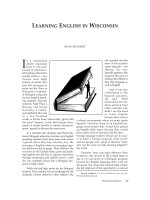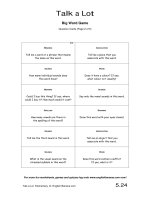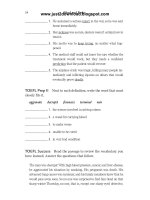Learning by doing 8 doc
Bạn đang xem bản rút gọn của tài liệu. Xem và tải ngay bản đầy đủ của tài liệu tại đây (53.34 KB, 6 trang )
GETTING INVOLVED IN LEARNING
71
notes or make drawings in your notebook, or speak into your tape
recorder. Record what was important or useful to you, as well as what was
confusing. Copy the sentence or phrase you’d like to remember, noting
the page it’s on.
If You Are Listening
If it’s an audiotape, listen to it once, just to get started. Then write in your
notebook what interested you most about what you heard. Return to that
part of the tape and listen to it again.
If you’re listening to a lecture or speech, you don’t have the oppor-
tunity to hear the whole thing once before you start. In that case, you
have to try to get interested before the talk begins. Does the lecture have
a title, for instance? Perhaps something in that title, if you think about it,
will remind you of something you know. Are there any audio-visual aids
in the room? Have you been given a handout? Any of these things can
help you find out what’s interesting to you about the talk before it begins.
If the speaker hasn’t given you any aids, focus on the speaker him- or her-
self. Does this look like a person you would trust to give you good infor-
mation or advice? Does he or she look like someone you know? Even
focusing on the speaker’s appearance may help you become interested in
what the speaker has to say.
ACTING OUT
What if you’re studying something and, despite your best efforts, you
don’t find anything of particular interest in it? Sometimes you just can’t
find anything that you can connect with.
In that case, pretend you’re someone else who can relate to the mate-
rial and has an interest in it! You can become interested in a subject when
you involve yourself in it, even when you’re just role-playing. (See Chap-
ter 5,“Learning by Doing,” for more on role-playing and other ways to be
an active learner.)
• Pretend you’re the instructor; decide what will be the focus of the
next class. Let that direct your studying.
HOW TO STUDY
72
• Act! Take on somebody else’s interests. If you’re studying man-
agement, for example, assume the role of a business executive. If
you’re studying for a science course, pretend you’re a research
biologist. And so on.
You’ll find yourself more responsible for your own learning when
you use your interests to connect with what you’re studying. The mater-
ial will be more meaningful to you and you’ll enjoy it more. Then you’ll
remember it better!
IN SHORT
Use what interests you. Find something familiar in what you’re studying
and build on it to help make sense of newer material. You can also
become interested in something by taking on someone else’s interests.
You can pretend you’re the instructor, or you can act the part of someone
connected to the subject you’re studying. When you use interest as your
foundation in study, you’re assuming more responsibility for your
studying. You’re making it meaningful to you.
GETTING INVOLVED IN LEARNING
73
Practice Tips
The next time you’re looking at a newspaper, choose a section you
rarely read. Choose any article in that section.
• Start with the headline. Make it interesting to you by finding a
familiar word or phrase and thinking about what you already
know about it.
• Use your hidden camera and skim the article to find something
else familiar.
• Assume the part of someone in the article who is being quoted.
Move around and act as you imagine that person might act as
you read the quote aloud.
• What else do you need to know to understand the article? Write
a list of questions you have. Direct some of the questions to the
reporter who wrote the article, and some of the questions to
someone quoted in the article.
• Now you’re ready to read the article—with interest!
CHAPTER
10
GETTING MORE
OUT OF READING
You can make more sense
of what you’re reading
when you get involved
with it. And you can do
this by anticipating what
you read before you
begin. While you read, ask
questions, make pictures in
your head, take notes, and
use your learning styles.
Stop when you don’t know
something, wait until you
understand it, and then
continue with the reading.
After you’ve finished
reading, think about what
you’ve learned.
H
ere’s a hard but not surprising truth:
Reading is work. It can be easy and enjoyable work, like
reading a good story or the comics. Or, it can be more
challenging work, such as reading a textbook or other study material.
Now think a minute about work. If you show up at your job and
just sit there till quitting time, did you work? No, you put in your time,
but you didn’t work—and if you keep acting that way, you’ll get fired.
It’s the same way with reading. If you just sit there, moving your eyes
There’s Reading—and There’s Reading
“I just don’t get this marine biology book. I can’t understand the
first chapter. I read it, and I don’t get anything out of it,” Sally com-
plains to Harry.
“How are you reading it?” Harry asks.
“What do you mean—how?” she answers.
“Well, how involved are you with what you’re reading?”
“What do you mean—involved? Reading is like TV, you look at
it and you get meaning,” Sally says.
“It sounds like you need to read more actively,” Harry tells her.
“Reading is very different from watching TV.”
Sally has a problem. She expects reading to come to her, like
her favorite sitcom on TV. She’s not treating reading as work, but
rather as a relaxing pastime. Having a difficult reading assignment
make sense means asking questions, making connections, and cre-
ating order—getting involved!
HOW TO STUDY
76
over the page, you aren’t really reading—and you’re not getting anything
out of it. To get the most out of what you read, you have to get actively
involved in the material. Your mind should be working before, while, and
after you read.
BEFORE YOU READ
WHAT’SINATITLE?
You have a title, even if you didn’t win a world heavyweight boxing match.
Mr., Ms., Mrs., and Miss are titles. In a sense, so are Mom, Dad, Sis, and
Brother. And there are many more. Get out your notebook and list your
own titles. Start with your name, your family relationships, and what peo-
ple call you in a formal setting (like Mr. or Ms.). List your job titles, and
any positions you hold in volunteer or professional organizations.
Like people, chapters, lessons, and books have titles that tell you
what they’re about. Just as you know Ms. Smith isn’t a man, you know the
article “Cooking Peas” isn’t about carrots. Titles are there to eliminate
confusion and give a general impression before the finer details are
known. Titles can tell you a lot—don’t overlook them!









